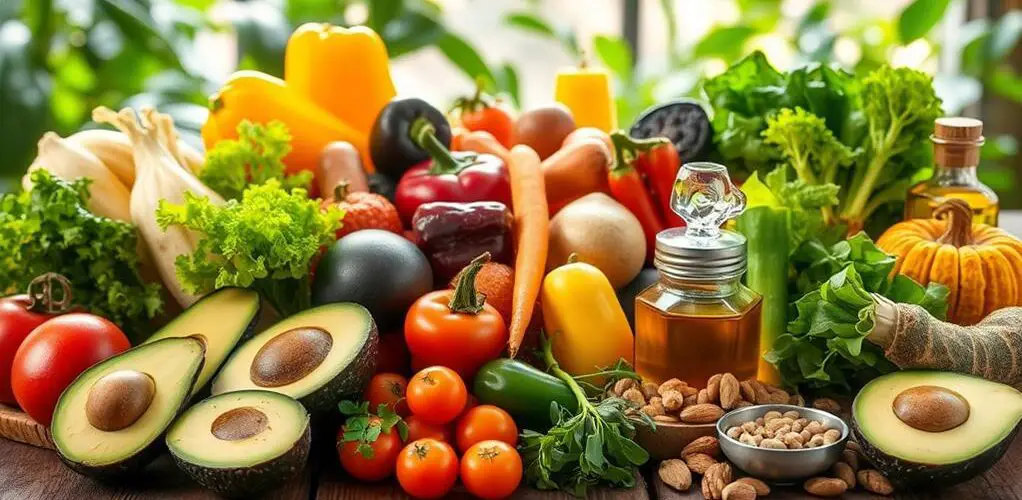
Following a vegetarian keto diet isn't as tricky as it sounds—your plate can be full of delicious, no-meat goodies! Think avocados, nuts, seeds, and low-carb veggies like spinach and cauliflower for fats and fiber. Protein can come from tofu, tempeh, and eggs if you eat them. You'll need to keep an eye on nutrients like vitamin B12 and iron, but fear not; there are plenty of plant-based sources and supplements. Keep your carbs super low and fats high, and your body will torch fat for energy, keeping you energized. Stick around to discover more tips and tasty recipes!
Key Takeaways
- Combine high-fat plant-based foods like avocados, nuts, and seeds with low-carb vegetables to maintain ketosis.
- Use tofu, tempeh, and eggs for protein while avoiding high-carb grains, legumes, and starchy vegetables.
- Monitor vitamin B12, iron, calcium, and omega-3 intake to prevent nutritional deficiencies.
- Include low-carb, fiber-rich vegetables like spinach and cauliflower to support digestion and nutrient absorption.
- Plan meals to ensure variety and adherence, incorporating dishes like veggie stir-fries, zucchini noodles, and chia pudding.
Understanding Vegetarian Keto
The Vegetarian Keto diet represents a unique fusion of vegetarianism and ketogenic nutritional principles, designed to promote ketosis and optimize fat metabolism. This diet combines the best of both worlds, but it's surrounded by many keto misconceptions and vegetarian myths. People often think you can't get enough protein without meat, or that all keto diets are packed with unhealthy fats. But that's not true here!
On the Vegetarian Keto diet, you'll avoid all meat and seafood. Instead, you get your protein from plant-based sources like tofu, tempeh, and, if you're a lacto-vegetarian, eggs. High-fat foods like avocados, nuts, and plant oils are also staples.
To stay in ketosis, you need to balance your meals with 70-90% fats, 5-15% protein, and 5-10% carbohydrates.
Planning is key to avoid deficiencies, especially in vitamin B12, iron, calcium, and omega-3 fatty acids, which are mostly found in animal products. Eating low-carb veggies like spinach, zucchini, and cauliflower helps maintain fiber intake while keeping carbs low, around 20-50 grams a day.
Adjusting can be tough, often causing "keto flu" symptoms like fatigue and headaches as your body adapts to burning fat instead of carbs.
Benefits of Vegetarian Keto
The vegetarian keto diet offers several impressive benefits, starting with weight loss.
Many people find that they can shed up to 31 pounds by sticking to this low-carb way of eating. Additionally, it helps control blood sugar levels, reducing the risk of diabetes, and promotes heart health through healthy fats from foods like avocados and nuts.
Weight Loss Benefits
Starting on a vegetarian keto diet can greatly enhance weight loss efforts, as evidenced by various studies. One reason is the caloric deficit created when you limit carbs and focus on high-fat, low-carb foods. This shift causes your body to undergo metabolic adaptation, burning fat instead of carbohydrates for energy.
Studies have shown that vegetarians might lose an extra 4.5 lbs (2 kg) compared to non-vegetarians on a low-carb diet. Imagine shedding around 31 lbs (14 kg) and seeing your Body Mass Index (BMI) drop. That's what many experience on a keto diet. When your body enters ketosis, it's like flipping a switch to become a fat-burning machine.
This not only helps with weight loss but also makes you feel more energetic. The vegetarian keto diet emphasizes foods rich in essential nutrients and antioxidants, which support overall health while you lose weight. So, you're not just dropping pounds; you're also giving your body the good stuff it needs.
This diet even helps improve insulin sensitivity, which makes weight loss easier and can be a game-changer for those struggling with type 2 diabetes. So, ready to give it a try?
Blood Sugar Control
While the vegetarian keto diet is renowned for its weight loss benefits, another compelling advantage lies in its capacity to improve blood sugar control. Studies reveal that vegetarians have a 53% lower risk of diabetes compared to non-vegetarians. This is a big deal, especially for those concerned about insulin resistance and maintaining blood sugar stability.
The vegetarian keto diet limits carbohydrate intake to 20-50 grams per day. This is like putting a cap on carbs, which helps stabilize blood sugar levels. When you eat fewer carbs, your body doesn't produce as much insulin, making it easier to manage insulin resistance.
Plus, high-fat, low-carb meals make you feel full. This means you're less likely to crave sugary snacks, which is awesome for keeping your blood sugar in check.
Low-glycemic index foods, like non-starchy veggies and healthy fats, also play a role. They help maintain steady energy levels without causing those nasty sugar spikes. Research even shows that people with type 2 diabetes on a keto diet can lose an average of 31 lbs (14 kg).
This weight loss further helps in controlling blood sugar, making the vegetarian keto diet a powerful tool for better health.
Heart Health Improvement
A robust heart is vital for overall well-being, and the vegetarian keto diet offers promising benefits for cardiovascular health. This diet focuses on plant-based fats, like avocados and nuts, which help lower bad cholesterol levels, reducing the risk of heart disease.
Research shows that plant-based diets can lower the risk of coronary heart disease by 30%, and the vegetarian keto diet amplifies these benefits through its low-carb approach.
Eating lots of antioxidants from low-carb veggies and healthy fats can reduce inflammation, which is super important for heart health. Plus, the diet's focus on fiber-rich foods, like leafy greens and seeds, supports healthy blood pressure and overall cardiovascular function.
Here's why the vegetarian keto diet rocks for your heart:
- Cholesterol management: Less bad cholesterol means a lower risk of heart disease.
- Weight loss: Shedding pounds, averaging 31 lbs (14 kg), equals a happier heart.
- Antioxidants: They help reduce inflammation, which is vital for a healthy heart.
- Fiber: Keeps blood pressure in check.
- Plant-based fats: Delicious and heart-friendly, what's not to like?
Incorporating these elements guarantees that your heart stays strong and healthy, making the vegetarian keto diet a win-win for your ticker!
Common Nutritional Challenges
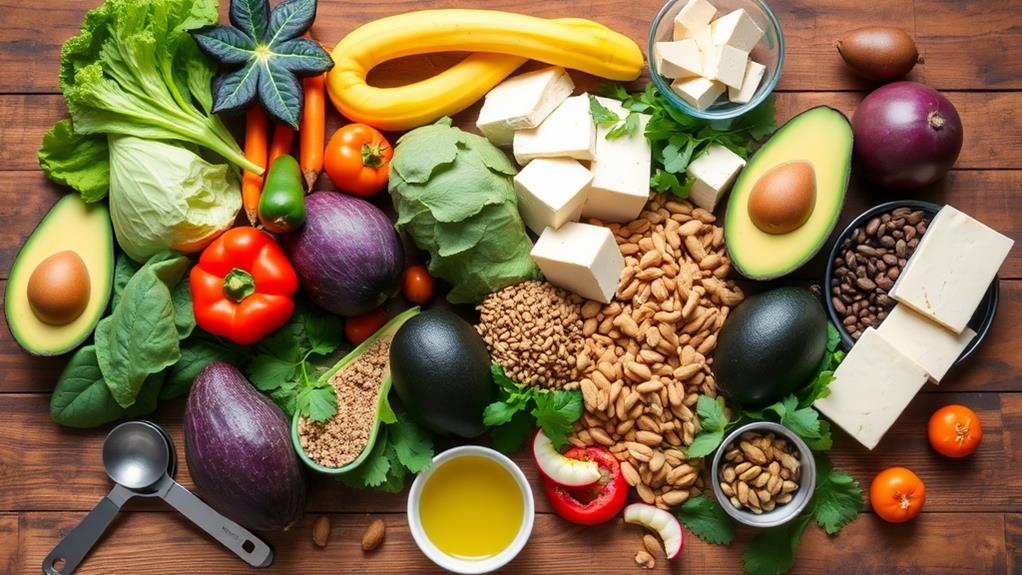
Maneuvering the vegetarian keto diet can be particularly challenging due to several common nutritional obstacles. One of the main issues is nutrient tracking, which is vital to guarantee you're getting enough vitamins and minerals. Protein supplementation becomes necessary since high-carb staples like beans and lentils are off-limits. Iron sources are another concern because plant-based iron is less easily absorbed. Alternatives for vitamin B12, typically found in meat, must be sought out as well.
To keep meals interesting, meal variety is key. Otherwise, you might find yourself eating the same bland foods every day. Hydration strategies also come into play, especially since the keto flu can make you feel sluggish. Omega 3 options, usually from fish, are limited, and you need to look for plant-based sources. Finally, calcium intake can be tricky without dairy or fortified foods.
Here's a table summarizing these challenges:
| Challenge | Solution |
|---|---|
| Nutrient Tracking | Regular monitoring |
| Protein Supplementation | Plant-based protein powders |
| Iron Sources | Spinach, tofu, lentils |
| B12 Alternatives | Nutritional yeast, supplements |
| Meal Variety | Diverse recipes |
| Hydration Strategies | Electrolyte drinks |
| Omega 3 Options | Chia seeds, flaxseeds |
| Calcium Intake | Almonds, fortified plant milk |
Foods to Include
When following a vegetarian keto diet, it's important to include foods that provide healthy fats and low-carb protein.
Think avocados, olive oil, and nuts like almonds, which are great for healthy fats, while tofu and tempeh are excellent for protein.
Don't forget about seeds like chia and flax, which help you stay full and energized without adding too many carbs.
Plant-Based Healthy Fats
Healthy fats are essential in a vegetarian keto diet, constituting approximately 70-90% of daily caloric intake. Focusing on plant-based healthy fats can help maintain ketosis while guaranteeing dietary balance.
Avocados are a superstar, providing about 15 grams of healthy fats and only 2 grams of net carbs per 100 grams. They're perfect for tasty avocado recipes. Nut varieties like pecans and macadamia nuts are also excellent; they're high in fat and low in carbs—pecans, for instance, offer just 4 grams of net carbs per ounce.
Seeds such as chia and flaxseeds are rich omega-3 sources. They pack around 9 grams of fat and only 1 gram of net carbs per tablespoon, promoting heart health. Incorporating plant-based oils like coconut oil and olive oil is another great way to boost fat intake. Coconut oil, with its 13.5 grams of fat per tablespoon, can even help increase ketone production.
To get you started, here are some key foods to include:
- Avocados: Perfect for salads and guacamole.
- Nuts: Great for snacking or adding to dishes.
- Chia and Flaxseeds: Ideal for smoothies and baking.
- Coconut Oil: Fantastic for cooking methods that require high heat.
- Olive Oil: Perfect for dressings and sautéing.
Incorporating these foods can make your meal prep easier and guarantee you enjoy tasty, healthy snacks.
Low-Carb Protein Sources
In a vegetarian keto diet, finding suitable low-carb protein sources is essential for maintaining muscle mass and overall health. One fantastic option is tofu. Tofu benefits include about 10 grams of protein and only 2 grams of net carbs per 100 grams, making it an excellent meat substitute. You can stir-fry it, bake it, or even scramble it!
Another great choice is tempeh, which offers a whopping 19 grams of protein and just 9 grams of net carbs per 100 grams. Tempeh recipes are versatile—you can marinate it, grill it, or add it to salads for a protein punch.
Egg nutrition is another major plus. A single large egg packs around 6 grams of protein and less than 1 gram of carbs. Scramble them, boil them, or make an omelette!
Greek yogurt is also a winner. Choosing full-fat yogurt varieties with no added sugars gives you about 10 grams of protein and only 4-7 grams of carbs per 6 ounces.
Don't forget about nut health. Macadamia nuts offer about 2 grams of protein and 2 grams of net carbs per ounce, while chia seeds contain around 5 grams of protein and 1 gram of net carbs per ounce. Enjoy them as snacks or add them to smoothies for a crunchy treat!
Foods to Avoid
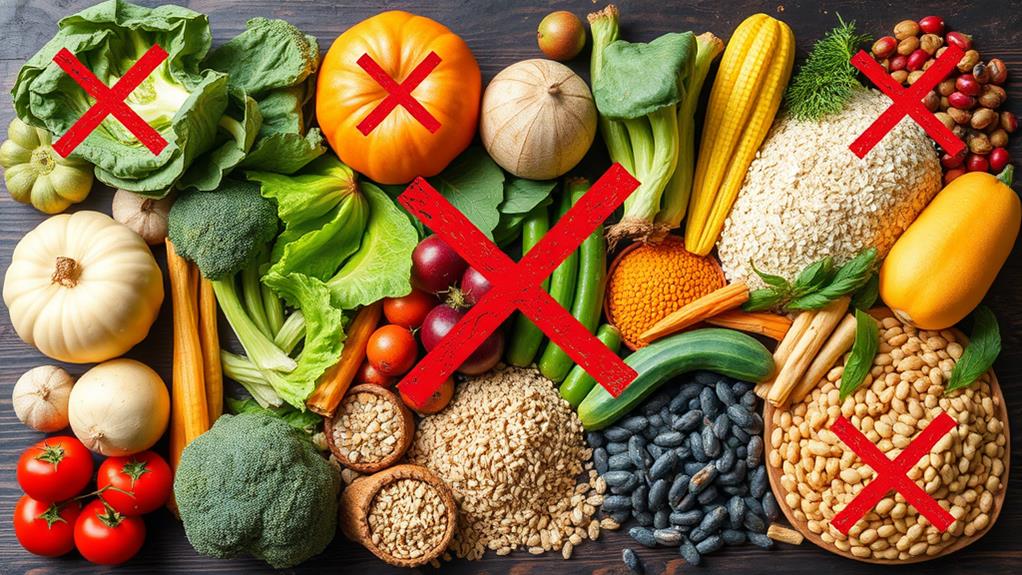
Maneuvering the vegetarian keto diet necessitates a precise understanding of which foods to avoid in order to maintain both the low-carb and meat-free requirements.
First and foremost, all types of meat and fish are off the table. It's essential to rely on meat alternatives and dairy substitutes to meet protein needs.
Equally important is steering clear of high-carb foods that can kick you out of ketosis. This includes grains like rice, bread, pasta, and cereals, which are rich in carbohydrates.
Legumes are another group to avoid. While they may be nutritious, their high carbohydrate content can disrupt the delicate balance required for ketosis.
Starchy vegetables, such as potatoes, corn, and sweet potatoes, also need to be excluded from your diet due to their high carb levels.
Most fruits should be limited as well, particularly those high in sugar like bananas, grapes, and mangoes. Only low-carb options like berries can be consumed in moderation.
To summarize, here are the key foods to avoid:
- Meat and fish
- Grains (rice, bread, pasta, cereals)
- Legumes (beans, lentils, peas)
- Starchy vegetables (potatoes, corn, sweet potatoes)
- High-sugar fruits (bananas, grapes, mangoes)
Sample Meal Plan
Creating a sample meal plan for a vegetarian keto diet can be exciting and delicious.
For breakfast, you might enjoy a chia seed pudding made with almond milk, topped with a few berries.
Lunch could be a spinach salad with avocado and nuts, while dinner might feature zucchini noodles tossed with marinara sauce and sautéed mushrooms.
Breakfast Options
Exploring breakfast options on a vegetarian keto diet offers an array of nutritious and delicious choices that align with dietary guidelines. One standout is chia pudding made with almond milk, a perfect blend of healthy fats and fiber with minimal carbs.
For those mornings when you're craving something warm and comforting, almond pancakes topped with a few berries or sugar-free syrup can be a delightful treat, providing a low-carb start to your day.
If you prefer savory over sweet, consider a hearty veggie breakfast. Scrambled eggs cooked in coconut oil or butter pair wonderfully with sautéed low-carb vegetables like zucchini and mushrooms, topped with creamy avocado or tangy feta cheese. This combo is not only tasty but also keeps you full and energized.
A rejuvenating spinach smoothie made with spinach, avocado, and unsweetened coconut milk is another excellent choice. It's nutrient-dense and incredibly low in carbs, making it ideal for a quick, on-the-go meal.
Finally, breakfast bowls featuring sautéed veggies, avocado, and cheese offer a savory and customizable way to start your day right.
- Chia pudding with almond milk
- Almond pancakes with berries
- Veggie breakfast with scrambled eggs
- Spinach smoothie with avocado
- Breakfast bowls with sautéed veggies and cheese
Lunch Ideas
For those adhering to a vegetarian keto diet, lunchtime presents an opportunity to incorporate a variety of nutrient-dense, low-carb ingredients into satisfying meals.
Envision this: a vibrant spinach salad topped with creamy avocado, crunchy nuts, and a drizzle of olive oil. This creative combination not only delivers healthy fats but also keeps carbs in check.
Imagine twirling zucchini noodles covered in rich marinara sauce, complemented by sautéed mushrooms. This dish is both filling and perfectly aligned with vegetarian keto principles.
For those who prefer a bit more protein, a stir-fry featuring tofu or tempeh with low-carb veggies like cauliflower and bell peppers can be both nutritious and delicious.
If you're in the mood for something warm, consider a hearty soup made with vegetable broth, non-starchy vegetables, and full-fat coconut milk.
It's a cozy meal that satisfies hunger while maintaining keto guidelines.
When time is tight, celery sticks paired with almond butter make for a quick, nutritious snack.
Dinner Suggestions
Wondering how to craft an appetizing yet low-carb dinner on a vegetarian keto diet? Search no more! We have a variety of delicious and nutritious options to keep your taste buds satisfied while staying within your carb limits.
A delightful dish to try is zucchini noodles tossed with a rich avocado pesto. This meal is not only low in carbs but also packed with healthy fats.
If you're craving something more substantial, consider a cauliflower rice stir-fry with tofu and assorted low-carb vegetables. This option delivers a punch of protein and fiber without tipping the carb scales.
For a hearty and satisfying dinner, stuffed bell peppers filled with a mouth-watering mix of mushrooms, spinach, and cheese are perfect.
Another great choice is a vegetable curry made with creamy coconut milk, served over steamed broccoli, ensuring a flavorful yet keto-friendly meal.
Lastly, eggplant lasagna using sliced eggplant instead of pasta, layered with ricotta and marinara sauce, offers a delicious and filling dinner option that aligns perfectly with vegetarian keto guidelines.
- Zucchini noodles with avocado pesto
- Cauliflower rice stir-fry with tofu
- Stuffed bell peppers with mushrooms and cheese
- Vegetable curry with coconut milk
- Eggplant lasagna with ricotta and marinara sauce
Enjoy these tasty dinners while staying on track with your vegetarian keto diet!
Protein Sources
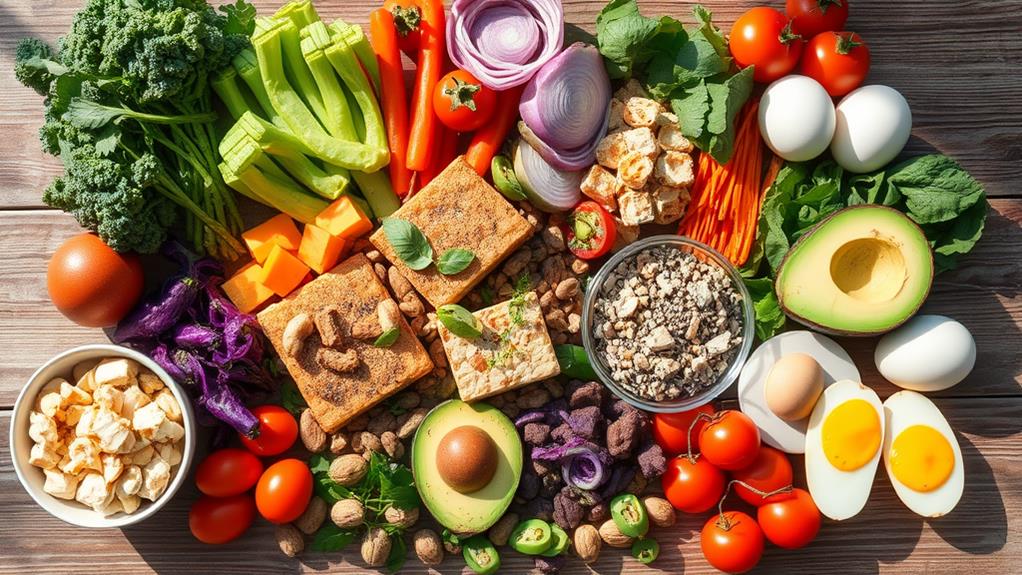
When adhering to a vegetarian keto diet, identifying appropriate protein sources is essential to maintaining nutritional balance while staying within the low-carb parameters. Tofu, known for its versatility and tofu benefits, is a great choice, offering 10-20 grams of protein per serving. Pair it with nutritional yeast for a complete protein boost. Tempeh is another fantastic option, and there are numerous delicious tempeh recipes to explore. Eggs, with their 6 grams of high-quality protein, are perfect for high protein meals, but if you're looking for egg alternatives, Greek yogurt is a solid choice. It provides 15-20 grams of protein per 6-ounce serving and can be enhanced with yogurt toppings like nuts and seeds.
Here's a quick look at some of these options:
| Protein Source | Protein Content (per serving) |
|---|---|
| Tofu | 10-20 grams |
| Tempeh | 10-20 grams |
| Eggs (large) | 6 grams |
| Greek Yogurt (6 oz) | 15-20 grams |
| Hemp/Chia Seeds | 9 grams |
| Nutritional Yeast | 8 grams |
For a snack, try seed snacks such as hemp seeds, which are rich in vegetarian protein. Finally, don't forget about protein shakes to round out your diet with ease.
Healthy Fats
Healthy fats are super important on a vegetarian keto diet, making up about 70-90% of your daily calories.
You can get these fats from tasty plant-based foods like avocados, nuts, seeds, and oils such as olive and coconut oil.
Not only do these fats keep you full and energized, but they also help you stay in ketosis and support overall health, especially your heart.
Plant-Based Fat Sources
In the vegetarian keto diet, plant-based fat sources play an essential role in ensuring adequate fat intake while maintaining nutritional balance.
These sources are not only rich in nutrient density but also offer fat variety, which is vital for overall health.
One standout is the avocado, providing about 15 grams of healthy fats per 100 grams. It's also packed with potassium and fiber, making it a powerhouse of nutrients.
Then there are nuts, like macadamias and pecans. These nuts are ideal because they have a high fat content, around 75-80%, and contain essential fatty acids that support heart health.
Seeds, such as chia and hemp, are another excellent source. They are rich in omega-3 fatty acids; for instance, chia seeds offer about 31 grams of fat and 10 grams of fiber per 100 grams.
Coconut oil is a versatile cooking fat, containing medium-chain triglycerides (MCTs) that quickly provide energy and promote ketone production.
Lastly, olive oil, especially extra virgin, is rich in monounsaturated fats and antioxidants. Including 2-3 tablespoons per day can help reduce inflammation and improve heart health.
- Avocados
- Macadamia and pecan nuts
- Chia and hemp seeds
- Coconut oil
- Extra virgin olive oil
Benefits of Healthy Fats
A vegetarian keto diet relies heavily on healthy fats to achieve and maintain ketosis, which is central to the diet's effectiveness. Healthy fats should make up around 70-90% of your daily calories, providing the energy you need. Sources like avocados, nuts, seeds, coconut oil, and olive oil aren't just tasty—they're packed with benefits!
For one, these fats help with fat absorption, especially for vitamins A, D, E, and K, which are essential for your health. Imagine your body like a sponge soaking up these essential nutrients more efficiently. It's pretty neat!
Plus, these fats have anti-inflammatory properties, which means they can help keep your heart in tip-top shape.
But wait, there's more! Healthy fats can also keep you feeling full longer, making it easier to manage your weight. This means fewer snack attacks and a better chance at reaching your weight loss goals.
They even help improve your cholesterol levels, reducing the risk of heart disease and giving your metabolism a boost. So, by including these fats in your diet, you're not just fueling your body but also giving it a lot of metabolic benefits. It's a win-win!
Balancing Fat Intake
Achieving the correct balance of fat intake is essential for the success of a vegetarian keto diet. Healthy fats should make up about 70-90% of your daily calories, with sources like avocados, nuts, seeds, and plant-based oils such as olive and coconut oil. This helps your body achieve fat adaptation, where it burns fat for energy instead of carbs.
Getting the right fats doesn't just mean eating a ton of avocados. It's also about variety and portion control. High-fat plant foods like chia seeds and flaxseeds are fantastic. They bring essential omega-3 fatty acids and fiber, which is great for your digestion.
Here are some tips to help you balance your fat intake:
- Avocados: Rich in healthy fats and super versatile.
- Nuts like macadamia and pecans: High in fat, low in carbs—perfect for staying in ketosis.
- Cooking oils: Coconut oil and MCT oil are great for quick energy and sustaining ketosis.
- Seeds: Chia and flaxseeds are packed with omega-3s and fiber.
- Variety and portion control: Mix different fats and watch portion sizes, especially with calorie-dense foods.
Low-Carb Vegetables
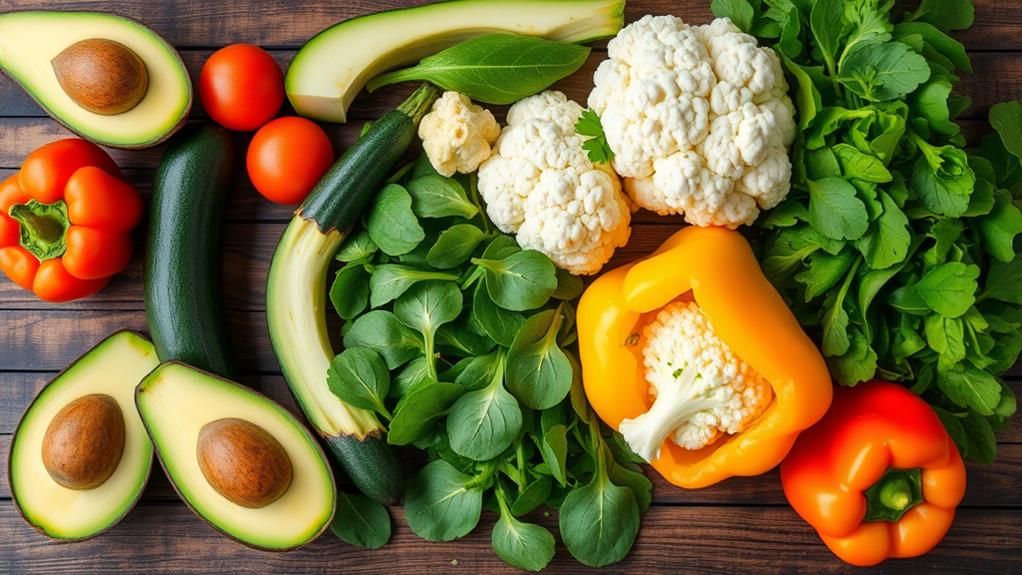
For those adhering to a vegetarian keto diet, selecting the right vegetables is essential to maintaining both nutritional balance and minimal carbohydrate intake. Low-carb benefits are immense, allowing you to enjoy a wide range of vegetable varieties without worrying about derailing your diet. Spinach, zucchini, cauliflower, and broccoli are prime examples, each typically containing only 1-5 grams of net carbs per serving. These veggie powerhouses not only keep your carb count low but also pack a nutritional punch.
Incorporating non-starchy vegetables like kale, asparagus, and bell peppers can further enhance your fiber intake. Fiber is critical for preventing digestive issues—nobody wants to feel bloated or uncomfortable, right? Plus, these veggies are bursting with vitamins and minerals. Spinach, for instance, is rich in iron and magnesium, while broccoli offers a generous dose of vitamin C and fiber.
When planning your meals, aim for at least 1-3 servings of very low-carb vegetables daily. Popular choices include Brussels sprouts (5g net carbs per half-cup), zucchini (3g net carbs per half-cup), and cauliflower, which can even replace rice or mashed potatoes with just 4g net carbs per half-cup.
Supplements and Micronutrients
Although a vegetarian keto diet can provide numerous health benefits, it often necessitates careful consideration of supplements and micronutrients to prevent deficiencies. Without meat, you might miss out on some essential nutrients, but don't worry, there are ways to fill the gaps!
First up, vitamin B12. This vitamin is super important for your nerves and blood, but it's mostly found in animal products. So, taking a B12 supplement is a must.
Next, let's talk about omega-3 fatty acids. Fish is a great source, but since that's off the menu, you can get your omega-3s from algae supplements.
Calcium is another biggie. If you're not eating dairy, you might not get enough calcium, which is key for strong bones. Consider a supplement, and don't forget about vitamin D to help absorb that calcium.
And what about iron? Plant-based iron isn't absorbed as well as the kind from meat, so taking an iron supplement can help avoid anemia.
Finally, regular blood test monitoring is a smart move to keep an eye on your levels.
Here's a quick list to keep you on track:
- Vitamin B12 supplements
- Algae supplements for omega-3 sources
- Calcium and vitamin D supplements
- Iron supplements for better iron absorption
- Regular blood test monitoring
With these strategies, you can stay healthy and rock your vegetarian keto diet!
Meal Planning Tips
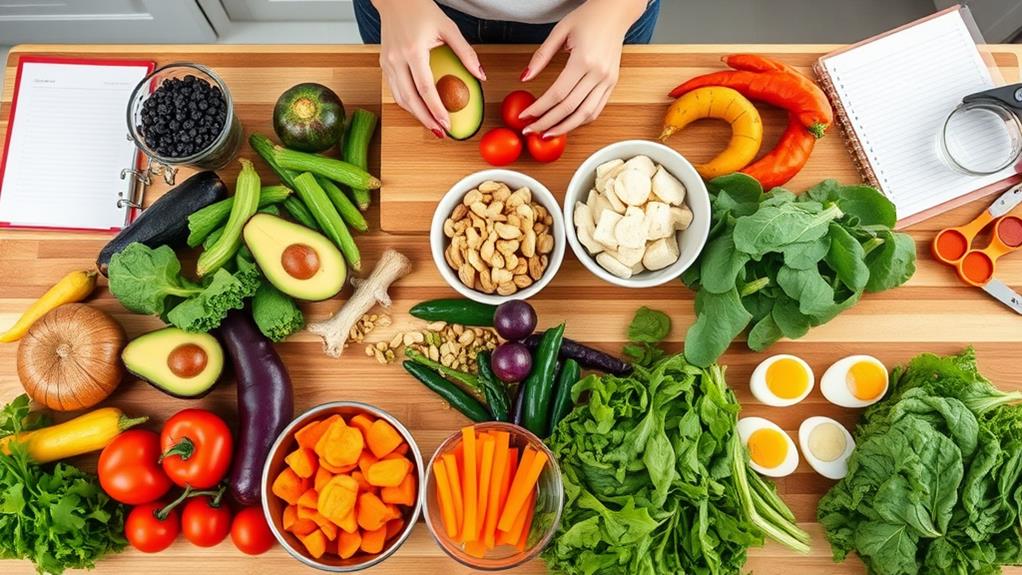
Steering through a vegetarian keto diet can be simplified by prioritizing high-fat, low-carb foods such as avocados, nuts, seeds, and healthy oils, guaranteeing you meet the essential macronutrient ratios of approximately 70% fats, 25% protein, and 5% carbs.
For successful meal planning, focus on incorporating a variety of low-carb vegetables like spinach, zucchini, and cauliflower. These veggies not only add flavor and texture but also guarantee you get enough fiber while keeping your carb count low.
When grocery shopping, make a list that includes plant-based protein sources like tofu, tempeh, and eggs if you're a lacto-vegetarian. These foods are vital for hitting your protein targets without blowing your carb budget.
To make life easier during hectic weeks, engage in meal prepping. By batch cooking and pre-portioning your meals, you'll have tasty, ready-to-eat vegetarian keto options at your fingertips, reducing the temptation to stray from your diet.
Get creative with low-carb substitutes! Swap out pasta for zucchini noodles and rice for cauliflower rice to enjoy your favorite dishes while sticking to keto guidelines.
Meal prepping these swaps can also save you time and keep your meals exciting. Happy cooking!
Overcoming Keto Flu
Shifting into a vegetarian keto diet can sometimes lead to experiencing "keto flu," a collection of symptoms such as fatigue, headaches, irritability, and nausea.
This happens to about 25% of people starting a ketogenic diet. The symptoms usually show up within the first few days of cutting carbs and can last from a few days to a week as your body adjusts to burning fat instead of carbs.
To manage these symptoms, here are some effective keto flu remedies:
- Stay Hydrated: Drink plenty of water to help your body flush out toxins and feel better.
- Increase Electrolyte Intake: Boost your sodium, potassium, and magnesium levels to counteract the loss of these minerals.
- Gradual Carb Reduction: Slowly reduce carbs instead of making a sudden cut. This helps your body adjust more smoothly.
- Healthy Fats Consumption: Eat enough healthy fats to keep your energy levels up and reduce discomfort.
- Nutrient-Dense Foods: Include low-carb, nutrient-rich foods in your diet to support your body during the adjustment.
Long-Term Considerations
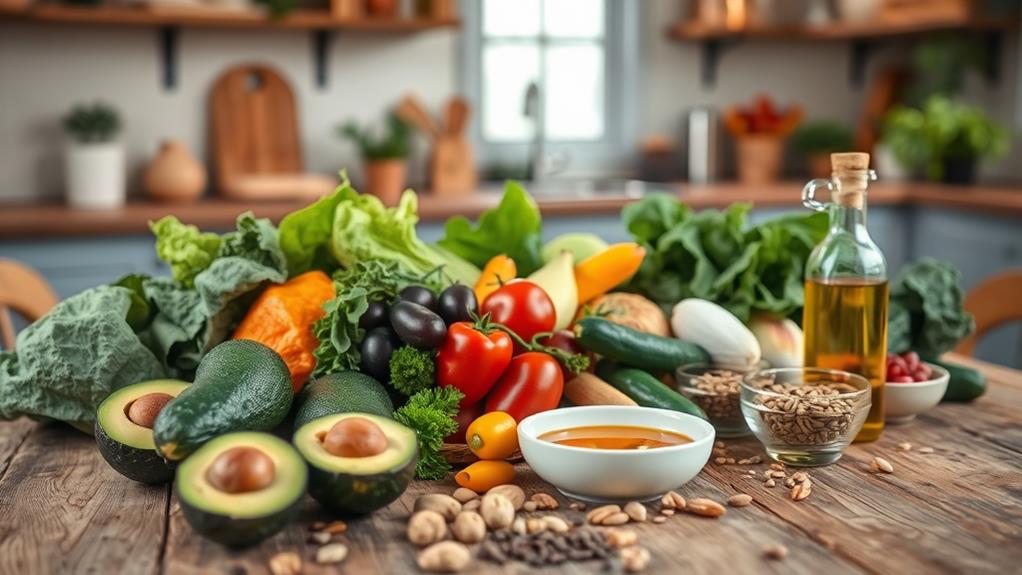
Ensuring the long-term success of a vegetarian keto diet hinges on meticulous planning and regular nutritional monitoring. This diet can be tricky since it cuts out many nutrient-rich animal products. You need to keep an eye on essential nutrients like vitamin B12, iron, and omega-3 fatty acids. Without regular nutrient monitoring, deficiencies in vitamins D, B12, calcium, and protein can creep up on you.
It's like trying to balance on a tightrope without a safety net!
Variety is another challenge. Sticking to the same meals can get boring fast. You might start yearning for a change, and that's when meal variety becomes vital. Mixing up your meals with different veggies, nuts, seeds, and plant-based proteins can keep things exciting.
It's like turning each meal into a colorful, tasty adventure.
Research shows vegetarian diets help with weight loss and metabolic health, but the long-term effects of a vegetarian keto diet are still up in the air. That's why checking in with healthcare pros or dietitians regularly is essential.
They can guide you and keep an eye on your health markers, making sure you're on the right track.
Delicious Recipe Ideas
Exploring delicious recipe ideas is essential for maintaining enthusiasm and variety in a vegetarian keto diet. Keeping meals exciting while staying within dietary guidelines can be a fun challenge.
Here are some tasty and nutritious dishes that also make meal prepping a breeze:
- Zucchini Noodles with Avocado Pesto: Swap traditional pasta for zucchini noodles. Toss them with a creamy avocado pesto, rich in healthy fats and fiber, for a satisfying, low-carb meal.
- Chia Seed Pudding: Make a simple pudding using unsweetened almond milk and chia seeds. Top with a few berries for a breakfast or snack packed with omega-3 fatty acids and low in carbs.
- Cauliflower Rice Stir-Fry: Sauté cauliflower rice with tofu and an assortment of low-carb vegetables. This dish is protein-rich and perfectly aligns with vegetarian keto principles.
- Spinach and Feta Stuffed Mushrooms: Create a flavorful appetizer by stuffing mushrooms with spinach and feta. This dish is low in carbohydrates and high in taste.
- Coconut Flour Brownies: For a keto dessert, bake brownies using coconut flour and a sugar-free sweetener. These brownies are delicious and guilt-free, making them perfect for satisfying sweet cravings.
These recipes not only keep your meals varied but also make sticking to a vegetarian keto diet enjoyable.
Frequently Asked Questions
Can You Do a Keto Diet if You Don't Eat Meat?
Yes, a ketogenic diet can be followed without consuming meat by incorporating plant fats, such as avocados and nuts, and dairy options for lacto-vegetarians. Ensuring adequate protein intake from sources like tofu and tempeh is essential.
How to Get Into Ketosis as a Vegetarian?
To get into ketosis as a vegetarian, limit carbs to 20-50 grams daily, emphasizing non-starchy vegetables and vegetarian fats like avocados and nuts. Monitor ketosis symptoms and guarantee adequate protein from sources like tofu and tempeh.
How to Get Enough Protein on a Vegetarian Keto Diet?
To guarantee sufficient protein on a vegetarian keto diet, focus on plant protein sources like tofu, tempeh, and nuts, complemented by protein supplements such as pea or hemp protein powders, while keeping carbohydrate intake minimal.
What Is a Keto Friendly Meat Alternative?
A keto-friendly meat alternative includes tofu options, which are low in carbohydrates and high in protein. Additionally, nut substitutes like edamame provide a protein-rich, low-carb solution suitable for maintaining muscle on a ketogenic diet.
Conclusion
Adopting a vegetarian keto diet involves understanding the nutritional balance required to maintain ketosis without meat. With careful planning, it offers benefits such as improved health markers and potential weight loss. Challenges include obtaining sufficient protein and essential nutrients. Key strategies involve selecting appropriate foods, avoiding high-carb options, and managing potential side effects like the keto flu. Long-term success depends on consistent meal planning and addressing evolving dietary needs.
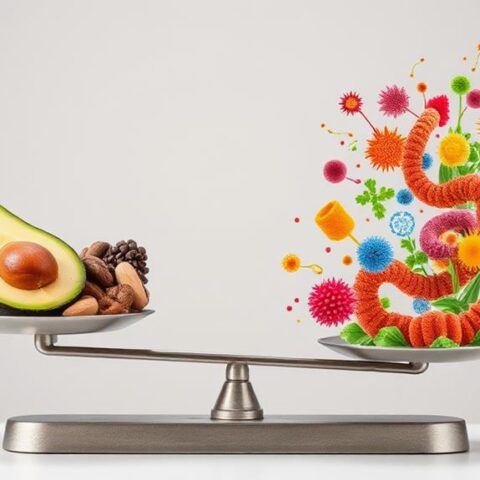



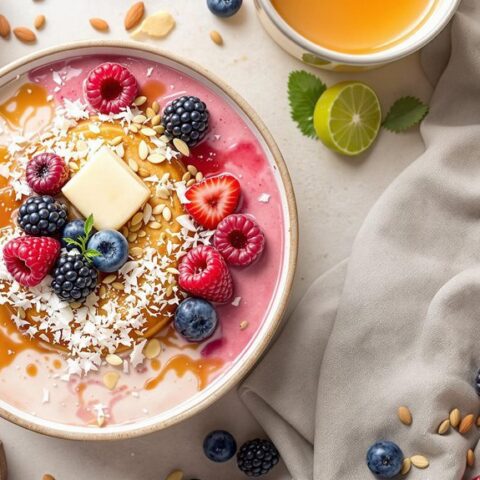
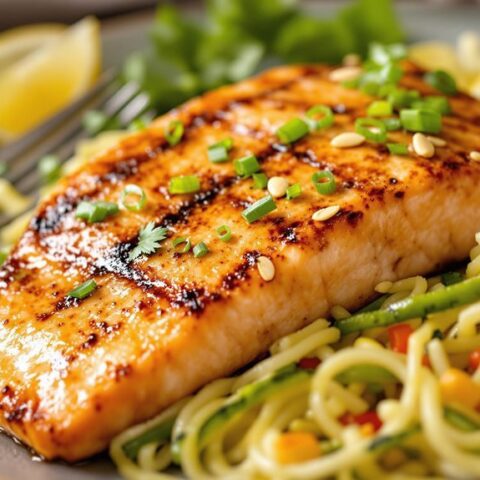




No Comments